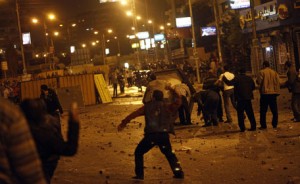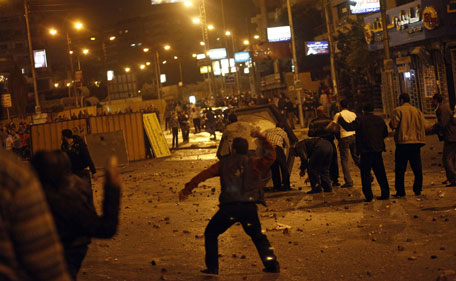
The fatal clashes at Ittahadeya palace on the night of 5 December 2012 were part of a conspiracy to attack former president Mohamed Morsi’s legitimacy, said the Muslim Brotherhood on Thursday.
The group released a statement on the one-year anniversary of violent clashes between protesters outside the palace last December, calling it part of a larger chain of events that acted as a conspiracy to allow the military to maintain control over the country.
The group stated that after Islamist groups seemed to have gained popularity on the street and in elections, secular counterparts, state institutions, and the media conspired to counteract success at the ballot box.
The Brotherhood also said that foreign states, including Saudi Arabia and the United States, spent money to contribute to bringing down Morsi.
The statement went on to claim that anti-Morsi protesters at the palace possessed narcotic substances and “devices used in acts of violence and vandalism.”
The statement also accused the protesters of “obscene chanting,” spraying inappropriate graffiti on the walls of the presidential palace, and attempting to breach the palace walls to storm the premises.
The group accused the National Salvation Front of instigating the conflict and arming its supporters, adding that eight of the ten who had been killed that night were members of the Muslim Brotherhood.
The violent clashes started after the Muslim Brotherhood called for demonstrations at the presidential palace, where anti-Morsi groups had already been demonstrating for a number of days and had begun staging a sit-in. The tents of those sitting in were torn down and violence between the two sides carried on for hours. Approximately ten people died as a result, with the Brotherhood claiming most of those who were killed were its members. Video evidence and eyewitness testimonies showed Brotherhood members detaining others and brutalising them.
Some of Morsi’s charges, for which he is currently standing trial, relate to the violence that occurred on 5 December including “inciting to kill protesters.”
In a speech the following night, Morsi blamed the unrest on the streets, which dramatically rose following his controversial November constitutional declaration, on “paid elements” and said that many of those implicated in the violence had been arrested.
Last month the Muslim Brotherhood similarly claimed that 2011 clashes on Mohamed Mahmoud Street were also part of a conspiracy “to drive a wedge between partners of the revolution.”


